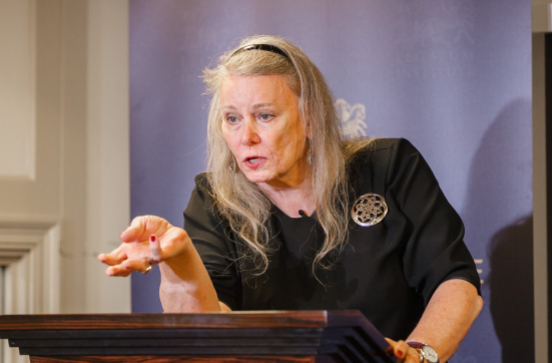
Last night saw the launch of the 2017 Trinity Economic Forum (TEF) with an opening address from Minister of Education, Richard Bruton, who spoke to a packed theatre of finding a compass in a dramatically changing economic environment.
The need to bridge the gap between public expectation and the reality of the situation at hand echoed throughout, stressing the importance of social glue in creating an indigenous engine of productivity going forward.
Bruton’s speech set the tone for keynote speaker and distinguished economist, David A Wells prize winner and published author of 16 books and over 350 articles, Prof Deirdre McCloskey.
McCloskey completed her undergraduate and graduate degrees in economics from Harvard before becoming a professor of economics at the University of Chicago and winning six honorary doctorates. She is noted for contribution to the cliometric revolution in economic history and her book trilogy.
McCloskey introduced her speech by setting the context of her most recent book in the trilogy, Bourgeois Equality, which investigates the capitalist system and how the world has seen unprecedented levels of economic growth since the 18th century. Quoting Adam Smith on how the biggest issue in the field of economics is the wealth of nations, she then asked what caused the surge in economic growth. Was the pivot-point an increase in investment, the beginning of international trade or the establishments of financial institutions? Did this burst of growth stem from exploitation intertwined with capitalist regimes?
McCloskey argues that none of these theories are correct. It is, in fact, human creativity that is at the heart of economic prosperity, bringing to fruition new ideas is what drives increase in productivity.
McCloskey continued to intrigue using the analogy of ideas having sex, generating new ideas and continuing the cycle. She then questioned what started the cycle, and what sparked the initial idea generation. The answer she argues, is liberty. Referencing Edmund Burke as a fierce defender of liberalism and quoting Adam Smith, McCloskey elaborated that it was the idea of equality, liberty and justice that inspired ordinary individuals to pursue their ideas.
However, leading on to the subject of equality, McCloskey was quick to differentiate that she does not stand for the same type of equality as Thomas Piketty speaks of but the equality of social standing and enterprise before the law. What matters ethically is that the poor have the opportunity to vote and to read and to receive equal treatment by the police and the courts, not equality in terms of wealth re-distribution. Defending capitalism, she states it is growth, not compelled charity, that solves the problem of poverty.
Further adding to her point, McCloskey ended her speech encouraging the audience to remember that it is not the government who are the source of enrichment, but liberalism. Governments that support large monopolies use “lord of the manner politics” to subjugate the masses and McCloskey believes people should be persuaded rather than enforced. Humane liberalism, she argues is the way forward.
Hints of McCloskey’s Christian beliefs became apparent in her economic idealisms as she continued to say that a dynamic society based on mutual agreements is the environment necessary to encourage creativity and idea ingenuity. However, is a system based on mutual agreements as opposed to government institutions the way forward, or is humane liberalism another utopian idealism?






